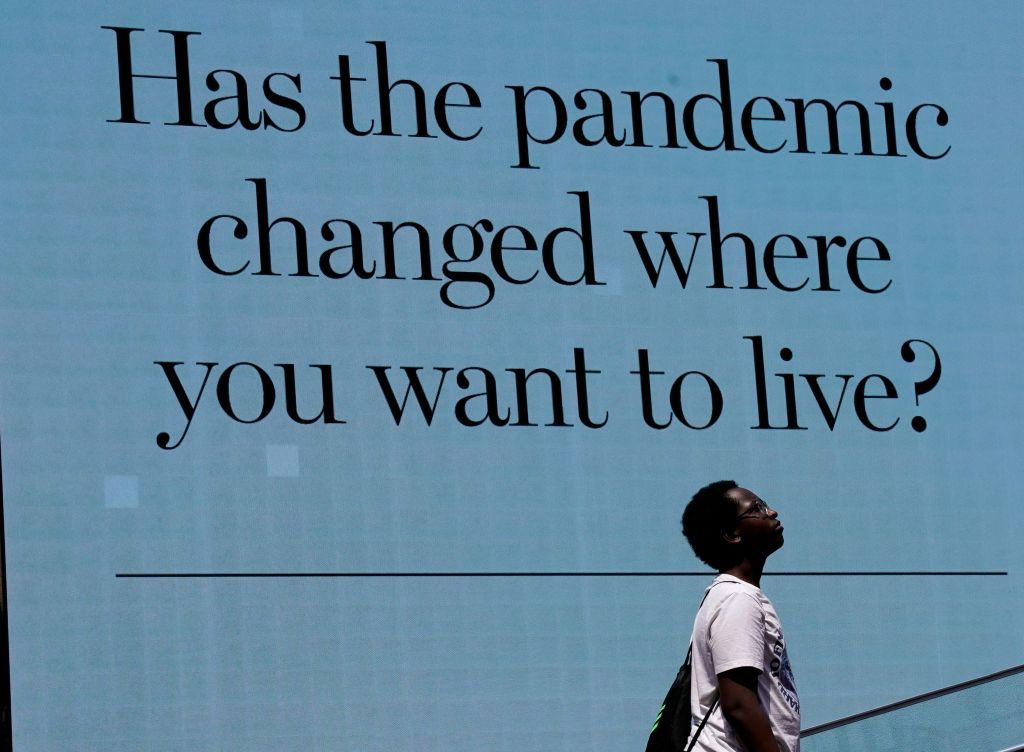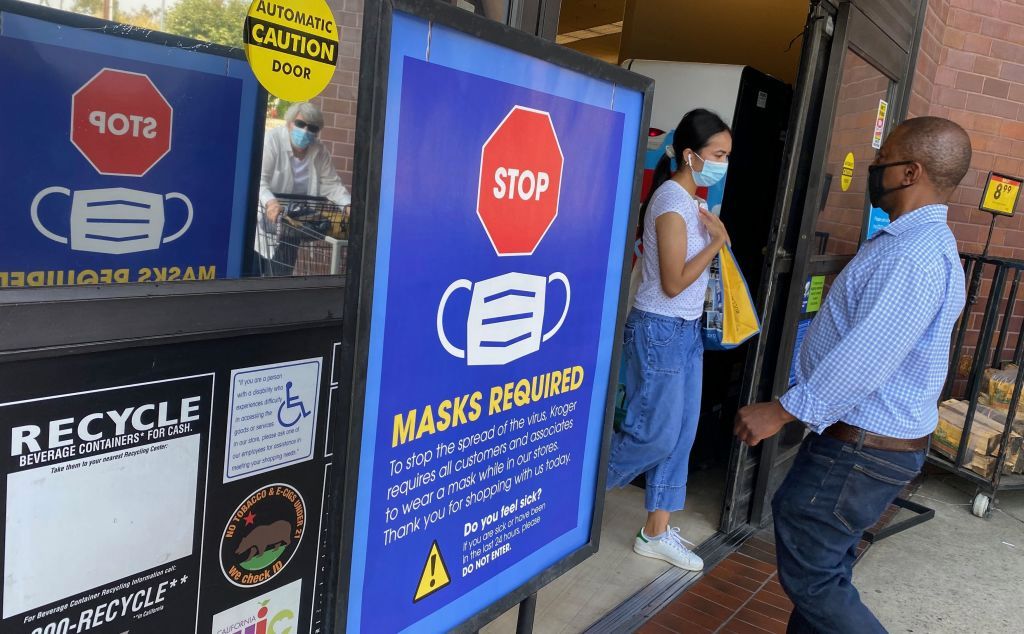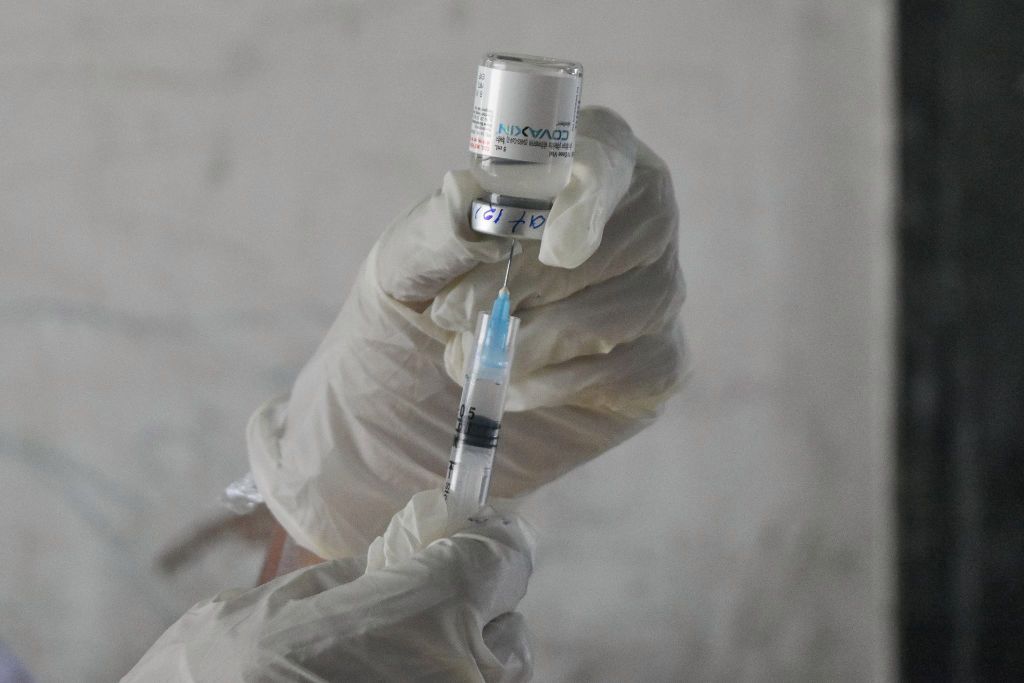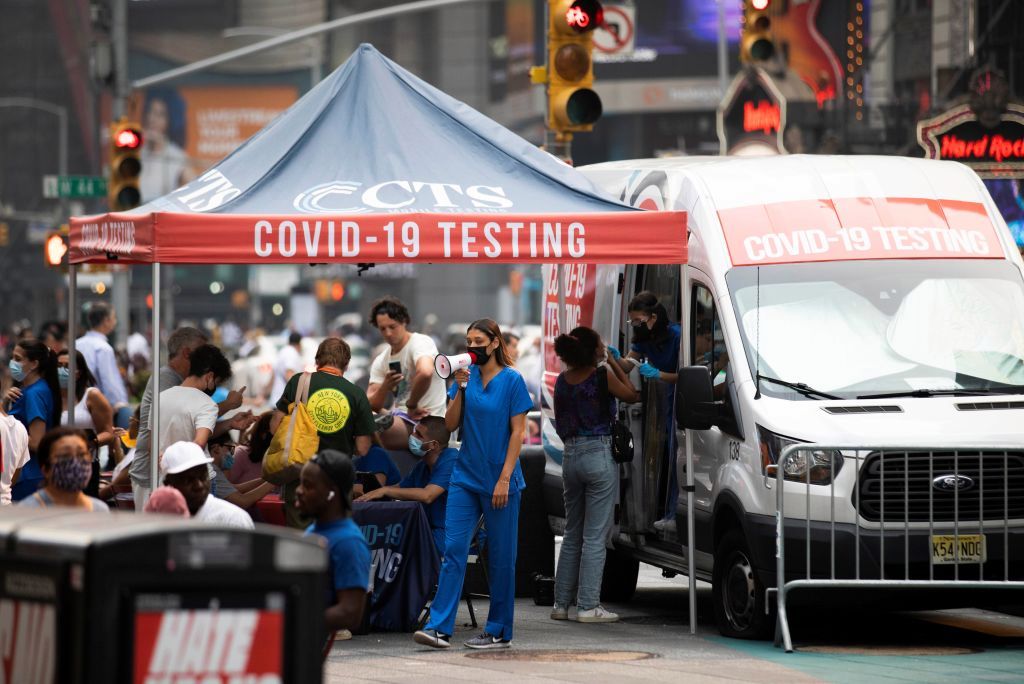
Source: TIMOTHY A. CLARY / Getty
It feels as though COVID-19 restrictions are slowly being lifted across the nation, but as the rise of new variants continues to climb, a great challenge lies ahead for the U.S. in ensuring that citizens are fully vaccinated and that steps are put in place to protect against more potent strains of the virus. Don’t take those masks off just yet. We’re still in a pandemic and here are the reasons why.
The Rise of the Delta Variant
The highly transmissible strain now accounts for a majority of COVID-19 cases in the U.S., according to the CDC. New statistics issued from the organization claim that the Delta variant now accounts for 83% of COVID-19 cases throughout the U.S. CDC director Rochelle Walensky added that “In some parts of the country the percentage is even higher, particularly in areas with low vaccination rates.” The surge in Delta variant cases saw a drastic uptick the week of July 3 by 50%.
“Over the last week we have averaged 239 deaths per day, an increase of nearly 48% over the prior week,” Waleknsky said. The case particularly holds to be true in places like Louisiana and Los Angeles that recently recorded more than 10,000 coronavirus cases in a week-– a number that the city hadn’t seen since March.
While all the vaccines are proven to protect against serious illness and potentially life-threatening complications from the virus, some are more effective than others. Yale Medicine notes that “Pfizer and Moderna’s vaccines are 95% and 94.1% effective against basic illness while “Johnson & Johnson vaccine is 72% effective.”
Masks
Lockdown and social distancing restrictions are being lifted in some parts of the U.S. People are continuing to follow social distancing and safety protocols by wearing masks, frequently washing hands, and keeping 6 feet apart. Masks still prove to be a major preventive measure against contracting COVID-19, according to the CDC. The organization says that they recommend wearing surgical masks that are loose-fitting and disposable. The protective gear is said to prevent droplets and sprays that might contain germs from coming into contact with an individual.

Source: CHRIS DELMAS / Getty
Alternatively, cloth masks can also be used to help fight against the spread of the virus. Masks with tightly woven fabric like cotton have been proved to trap respiratory droplets when the wearer talks, coughs, or sneezes. It also provides a layer of protection for the wearer from potentially becoming exposed to droplets released by others.
For African Americans, the impact of wearing a mask could save lives for members in the community who are disproportionately affected at a higher rate by the virus compared to other racial groups. Based on statistics gathered by the Covid Racial Tracker, nationwide, Black people have died at 1.4 times the rate of white people from COVID-19. Studies have attributed the findings to higher rates of diabetes, hypertension, and inadequate access to healthcare as potential catalysts for higher infection and death rates among communities of color.
Vaccination Rates
According to the CDC, nearly 161.5 million people across the nation are now fully vaccinated against the coronavirus. Additionally, more than 56% of the population has received at least one dose of the vaccine. However, CDC director Rochelle Walensky explained that vaccination rates differ state by state.
“Vaccine coverage varies by state and by county. Communities, where people remain unvaccinated, are most vulnerable and are most likely to experience an increase in case counts.”
KFF notes that nearly 70% (68.3%) of the adult population in the United States have received at least one dose of a COVID-19 vaccine. However, the states are still showing lower vaccination rates among communities of color despite a larger supply of vaccines across the country. The recent findings also show that White communities had a higher vaccination rate than in states where Black and brown communities reside. The studies show that White people received at least one dose of the vaccine roughly 1.3 times higher than Black people (36%) and 1.2 times higher than the rate of Hispanic people (41%) as of July 19, 2021.
The data also claimed that “White people had a higher vaccination rate compared to Hispanic people in all reporting states, except Vermont, Missouri, DC, Louisiana, and Tennessee, and a higher rate than Black people in every reporting state, except Oregon, Alaska, and Idaho.”

Source: NurPhoto / Getty
The publication adds that: “The vaccination rate for Black people is less than 50% in 38 of 42 reporting states, including 14 states where less than a third of Black people have received one or more doses.
Earlier this month drugmaker Pfizer announced that they would be seeking approval from the FDA to develop a third dose with the hopes of protecting people from contracting the Delta variant.
However, the European Medicine Agency and the FDA issued statements stating it would not be necessary for Americans to take the third shot quite yet.
But as office returns accelerate, some employees may want different options. A May survey of 1,000 U.S. adults showed that 39% would consider quitting if their employers weren’t flexible about remote work. The generational difference is clear: Among millennials and Gen Z, that figure was 49%, according to the poll by Morning Consult on behalf of Bloomberg News.
Working From Home
According to an article by USA Today, 40% of Americans say that they prefer to continue working from home as the uncertainty still looms around the pandemic. In fact, workers across the U.S have become so comfortable working from their flats that productivity for employers has skyrocketed.
Growing concerns around the Delta variant have made some workers weary of returning to the workplace, so much so, that some are even considering quitting their jobs if asked to return.
A study conducted by Morning Consult polled 1000 U.S. citizens about whether or not they plan to return to work. 39% said that they would ditch their current positions if working from home was not an option. Workers said that they have been able to save tremendously on commuting in addition to other benefits. “More than a third of the respondents said they save at least $5,000 per year by working remotely,” according to the findings.
Working from home is proving to be the most beneficial for Black employees. Slack’s Future Forum survey found that 64% of Black respondents “were able to better manage their stress while working from home.” For Black employees, remote work could be a safer option for those who are often hit with microaggressions and even racism in the workplace.
Katherine Cauley told Insider that she was happy when she realized working from home would be her new normal. The 25-year-old Black energy utility specialist said she was often asked uncomfortable questions about her hair by co-workers including some that would question if it was actually hers.
“They asked a lot of questions that felt overwhelming to me,” Cauley added before clarifying that they were “well-intentioned.”

Source: Xinhua News Agency / Getty
“I started changing my hair like crazy because I didn’t have to hear anything about it,” Cauley continued.
Additionally working from home has been able to save some Black families a significant amount of money in childcare. The Atlantic reported that 60% of Black women are breadwinners for their families. Mothers are benefiting from balancing their busy schedules with work-from-home positions in order to take care of their children. This prevents Black mothers from outsourcing childcare that often comes with hefty fees.
While all of this proves to be beneficial for workers of color Ada Harvey Wingfield, a sociology professor at Washington University in St. Louis suggests that workers might miss out on building some of the network connections they need for potential promotions at work.
“You can work from home, and you can be away from a lot of the interpersonal challenges that can make it harder for Black workers,” Harvey Wingfield said. “But I worry that working from home will also take Black workers out of the networks and connections that they need to advance in the modern workplace.”
SEE ALSO:
The Delta Variant Is On The Move: The Pandemic Isn’t Over, It’s Shifting
Howard University Receives $1.59M Grant For Vaccination Efforts In Underserved Communities
[ione_media_gallery id=”3917798″ overlay=”true”]
